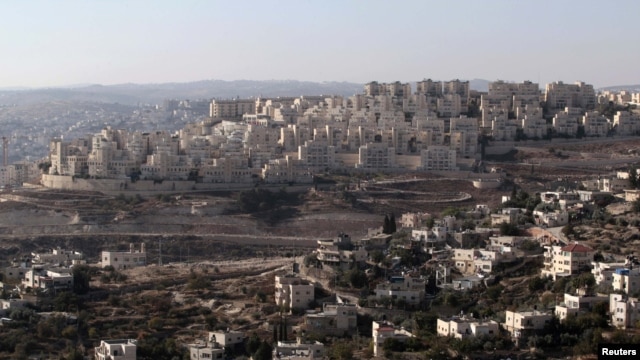U.S. condemns new Israeli settlement plan
| Publisher | Radio Free Europe/Radio Liberty |
| Publication Date | 1 December 2012 |
| Cite as | Radio Free Europe/Radio Liberty, U.S. condemns new Israeli settlement plan, 1 December 2012, available at: https://www.refworld.org/docid/50c2098c7.html [accessed 4 June 2023] |
| Disclaimer | This is not a UNHCR publication. UNHCR is not responsible for, nor does it necessarily endorse, its content. Any views expressed are solely those of the author or publisher and do not necessarily reflect those of UNHCR, the United Nations or its Member States. |
December 01, 2012
By RFE/RL
 Israel has announced that it plans to build 3,000 more housing units in East Jerusalem and the West Bank.
Israel has announced that it plans to build 3,000 more housing units in East Jerusalem and the West Bank.
The United States has condemned as "counterproductive" Israel's plan to build thousands more Jewish settler homes in East Jerusalem and the West Bank.
Secretary of State Hillary Clinton said the Israeli move set back the cause of a negotiated peace between Israel and the Palestinians.
Clinton spoke at an event in Washington that was attended by top Israeli officials, including Foreign Minister Avigdor Lieberman and Defense Minister Ehud Barak.
It was announced earlier on November 30 that Israel planned to build 3,000 more housing units in East Jerusalem and the West Bank.
The Israeli move came after the United Nations General Assembly rejected warnings from Israel and the United States and voted on November 29 to recognize Palestine as a nonmember UN observer state.
The Palestinians want a future Palestinian state to include the West Bank and have East Jerusalem as its capital.
The United States and Israel were among just nine countries that voted against the UN General Assembly resolution.
With the vote, analysts say the General Assembly implicitly recognized the Palestinians' claim for a state on all the West Bank, East Jerusalem, and the Gaza Strip.
Washington says such decisions should be made only in direct negotiations between Israel and the Palestinians.
There have been no substantive talks between the two sides for two years.
Clinton: 'Occupy The Moral High Ground'
Speaking at the Saban Center for Middle East Policy, Clinton called on both the Israelis and Palestinians to carefully consider the path ahead and how the sides can succeed in negotiating a two-state solution.
In addition to criticizing Israel for its announcement to build in the West Bank and East Jerusalem, Clinton also faulted Palestinian National Authority President Mahmud Abbas for pursuing this week's UN resolution.
Clinton said Abbas had taken a step in the "wrong direction."
"Palestinian leaders need to ask themselves what unilateral action can really accomplish for their people. President Abbas took a step in the wrong direction this week. We opposed his resolution, but we also need to see that the Palestinian Authority in the West Bank still offers the most compelling alternative to rockets and permanent resistance," Clinton said.
"At a time when religious extremists claim to offer rewards in the hereafter, Israel needs to help those committed to peace deliver for their people in the here and the now. "
Abbas's Palestinian National Authority in the West Bank is regarded by the United States as a reliable partner for peace, as opposed to Hamas, which rules the Gaza Strip and continues to call for Israel's destruction.
Clinton also urged Israel to take what she called the "moral high ground" in its dealings with the Palestinians.
"I really believe this with all of my heart – I think that even if you can't reach a complete agreement that resolves all these incredibly hard issues, it is in Israel's interest to be trying," she said.
"It gives Israel a moral high ground that I want Israel to occupy. That's what I want Israel to occupy – the moral high ground."
At the United Nations on November 30, Palestinian envoy Riyad Mansour described the Israeli building announcement as a "provocation" delivered in response to the General Assembly vote.
The envoy spoke behind a new UN name plate reading "State of Palestine."
The motion in the General Assembly was supported by 138 countries and opposed by nine, while 41 states abstained.
With reporting by dpa, Reuters, and AFP
Link to original story on RFE/RL website
